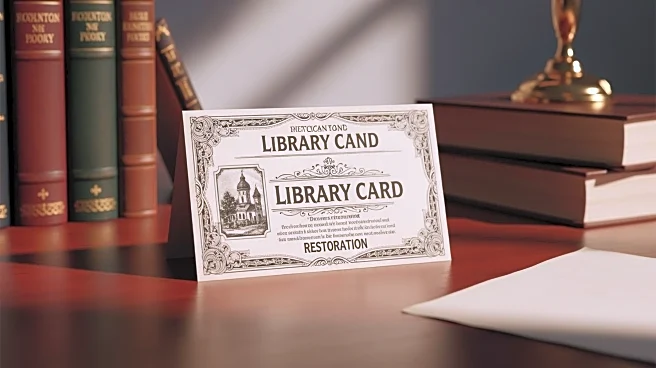What's Happening?
Oscar Wilde, the renowned author, had his library card revoked by the British Library over 130 years ago due to charges of 'gross indecency,' a term used in the 19th century to describe homosexual acts.
Recently, the British Library has decided to reissue Wilde's library card, symbolically granting it to his grandson. This act serves as a posthumous acknowledgment of Wilde's contributions to literature and society, as well as a gesture towards rectifying past injustices. The new library card uses Wilde's date of death, November 30, 1900, as its expiry date, marking a significant moment in the history of literary and social justice.
Why It's Important?
The reissuance of Oscar Wilde's library card by the British Library is significant as it represents a broader societal shift towards recognizing and correcting historical injustices against LGBTQ+ individuals. Wilde's persecution for his sexuality was emblematic of the discrimination faced by many during his time. This gesture by the British Library not only honors Wilde's legacy but also highlights the ongoing efforts to address past wrongs and promote inclusivity. It serves as a reminder of the progress made in LGBTQ+ rights and the importance of acknowledging historical figures who were marginalized.
What's Next?
While the reissuance of Oscar Wilde's library card is largely symbolic, it may inspire other institutions to reconsider their historical actions and make amends where possible. This could lead to further recognition and celebration of Wilde's work and life, potentially influencing educational and cultural discussions around LGBTQ+ history. Additionally, it may encourage libraries and cultural institutions to engage in similar acts of reconciliation, fostering a more inclusive environment for future generations.
Beyond the Headlines
The decision to reissue Oscar Wilde's library card also raises questions about how society chooses to remember and honor historical figures. It challenges institutions to reflect on their past actions and consider how they can contribute to a more equitable future. This act of reissuance may prompt discussions about the role of cultural institutions in shaping public memory and the importance of acknowledging diverse narratives in history.











